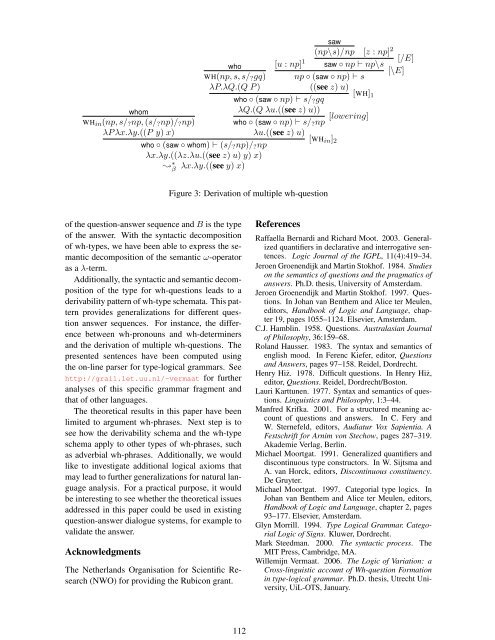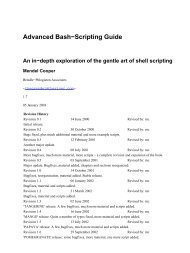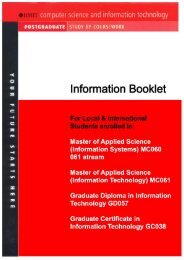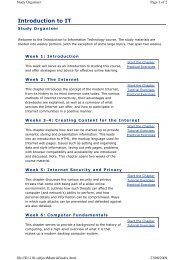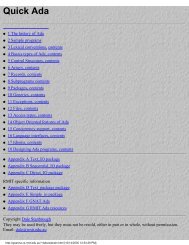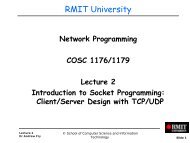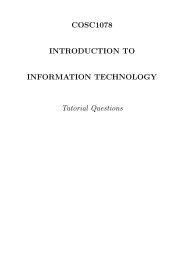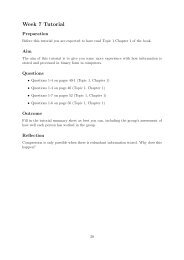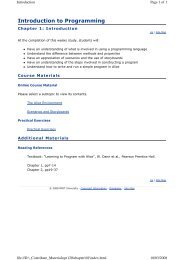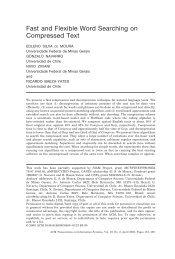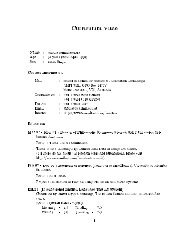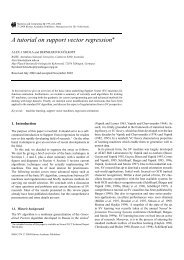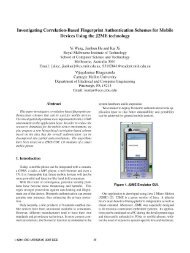Automatic Mapping Clinical Notes to Medical - RMIT University
Automatic Mapping Clinical Notes to Medical - RMIT University
Automatic Mapping Clinical Notes to Medical - RMIT University
Create successful ePaper yourself
Turn your PDF publications into a flip-book with our unique Google optimized e-Paper software.
who [u : np]<br />
WH(np, s, s/?gq)<br />
λP.λQ.(Q P )<br />
1<br />
saw<br />
(np\s)/np [z : np] 2<br />
[/E]<br />
saw ◦ np ⊢ np\s<br />
[\E]<br />
np ◦ (saw ◦ np) ⊢ s<br />
((see z) u)<br />
[WH]1<br />
who ◦ (saw ◦ np) ⊢ s/?gq<br />
λQ.(Q λu.((see z) u))<br />
who ◦ (saw ◦ np) ⊢ s/?np [lowering]<br />
λu.((see z) u)<br />
[WHin]2<br />
who ◦ (saw ◦ whom) ⊢ (s/?np)/?np<br />
λx.λy.((λz.λu.((see z) u) y) x)<br />
❀∗ β λx.λy.((see y) x)<br />
whom<br />
WHin(np, s/?np, (s/?np)/?np)<br />
λP λx.λy.((P y) x)<br />
of the question-answer sequence and B is the type<br />
of the answer. With the syntactic decomposition<br />
of wh-types, we have been able <strong>to</strong> express the semantic<br />
decomposition of the semantic ω-opera<strong>to</strong>r<br />
as a λ-term.<br />
Additionally, the syntactic and semantic decomposition<br />
of the type for wh-questions leads <strong>to</strong> a<br />
derivability pattern of wh-type schemata. This pattern<br />
provides generalizations for different question<br />
answer sequences. For instance, the difference<br />
between wh-pronouns and wh-determiners<br />
and the derivation of multiple wh-questions. The<br />
presented sentences have been computed using<br />
the on-line parser for type-logical grammars. See<br />
http://grail.let.uu.nl/~vermaat for further<br />
analyses of this specific grammar fragment and<br />
that of other languages.<br />
The theoretical results in this paper have been<br />
limited <strong>to</strong> argument wh-phrases. Next step is <strong>to</strong><br />
see how the derivability schema and the wh-type<br />
schema apply <strong>to</strong> other types of wh-phrases, such<br />
as adverbial wh-phrases. Additionally, we would<br />
like <strong>to</strong> investigate additional logical axioms that<br />
may lead <strong>to</strong> further generalizations for natural language<br />
analysis. For a practical purpose, it would<br />
be interesting <strong>to</strong> see whether the theoretical issues<br />
addressed in this paper could be used in existing<br />
question-answer dialogue systems, for example <strong>to</strong><br />
validate the answer.<br />
Acknowledgments<br />
The Netherlands Organisation for Scientific Research<br />
(NWO) for providing the Rubicon grant.<br />
Figure 3: Derivation of multiple wh-question<br />
112<br />
References<br />
Raffaella Bernardi and Richard Moot. 2003. Generalized<br />
quantifiers in declarative and interrogative sentences.<br />
Logic Journal of the IGPL, 11(4):419–34.<br />
Jeroen Groenendijk and Martin S<strong>to</strong>khof. 1984. Studies<br />
on the semantics of questions and the pragmatics of<br />
answers. Ph.D. thesis, <strong>University</strong> of Amsterdam.<br />
Jeroen Groenendijk and Martin S<strong>to</strong>khof. 1997. Questions.<br />
In Johan van Benthem and Alice ter Meulen,<br />
edi<strong>to</strong>rs, Handbook of Logic and Language, chapter<br />
19, pages 1055–1124. Elsevier, Amsterdam.<br />
C.J. Hamblin. 1958. Questions. Australasian Journal<br />
of Philosophy, 36:159–68.<br />
Roland Hausser. 1983. The syntax and semantics of<br />
english mood. In Ferenc Kiefer, edi<strong>to</strong>r, Questions<br />
and Answers, pages 97–158. Reidel, Dordrecht.<br />
Henry Hi˙z. 1978. Difficult questions. In Henry Hi˙z,<br />
edi<strong>to</strong>r, Questions. Reidel, Dordrecht/Bos<strong>to</strong>n.<br />
Lauri Karttunen. 1977. Syntax and semantics of questions.<br />
Linguistics and Philosophy, 1:3–44.<br />
Manfred Krifka. 2001. For a structured meaning account<br />
of questions and answers. In C. Fery and<br />
W. Sternefeld, edi<strong>to</strong>rs, Audiatur Vox Sapientia. A<br />
Festschrift for Arnim von Stechow, pages 287–319.<br />
Akademie Verlag, Berlin.<br />
Michael Moortgat. 1991. Generalized quantifiers and<br />
discontinuous type construc<strong>to</strong>rs. In W. Sijtsma and<br />
A. van Horck, edi<strong>to</strong>rs, Discontinuous constituency.<br />
De Gruyter.<br />
Michael Moortgat. 1997. Categorial type logics. In<br />
Johan van Benthem and Alice ter Meulen, edi<strong>to</strong>rs,<br />
Handbook of Logic and Language, chapter 2, pages<br />
93–177. Elsevier, Amsterdam.<br />
Glyn Morrill. 1994. Type Logical Grammar. Categorial<br />
Logic of Signs. Kluwer, Dordrecht.<br />
Mark Steedman. 2000. The syntactic process. The<br />
MIT Press, Cambridge, MA.<br />
Willemijn Vermaat. 2006. The Logic of Variation: a<br />
Cross-linguistic account of Wh-question Formation<br />
in type-logical grammar. Ph.D. thesis, Utrecht <strong>University</strong>,<br />
UiL-OTS, January.


